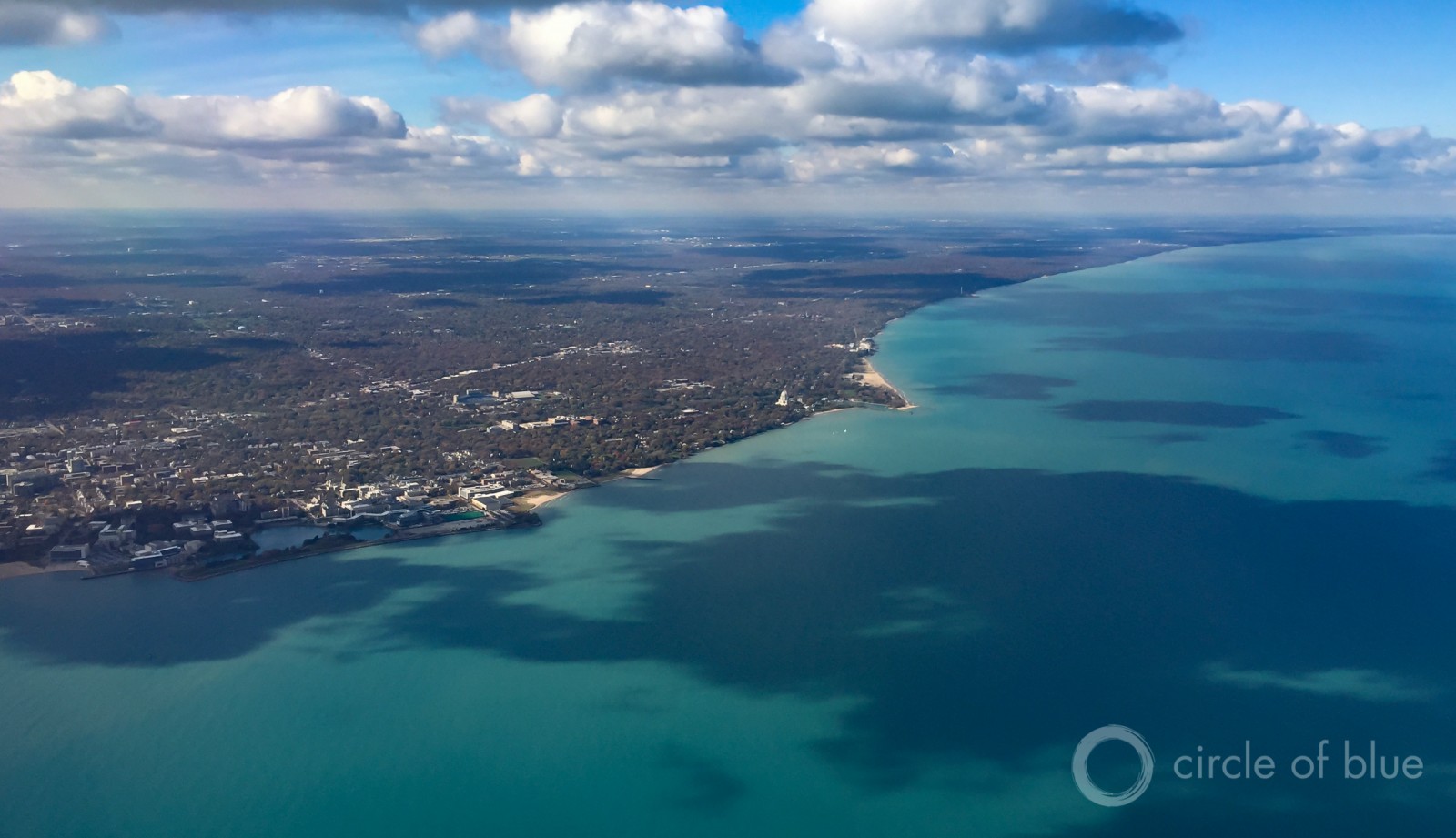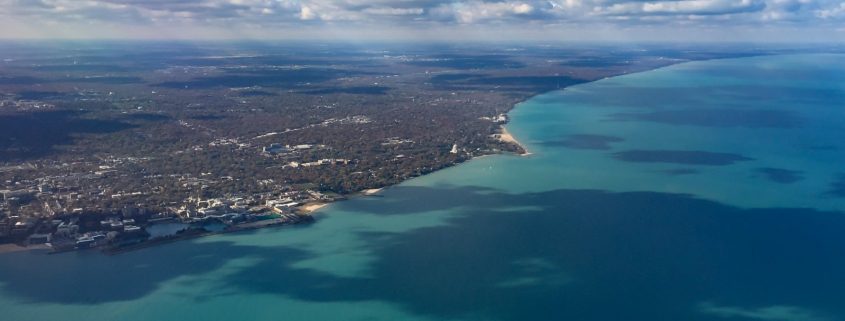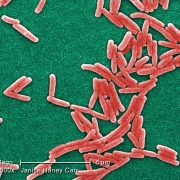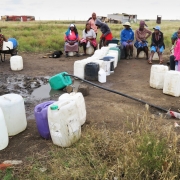Waukesha Another Step Closer To Great Lakes Water
A regional committee found that the city meets the requirements for an out-of-basin diversion, with conditions.

The city of Waukesha, Wisconsin, located just outside the Great Lakes Basin, is asking to withdraw water from Lake Michigan for public supply. The request is the first major test of the binational Great Lakes Compact that bans most out-of-basin water diversions. Photo © J. Carl Ganter / Circle of Blue
By Codi Kozacek
Circle of Blue
Representatives of the eight states and two Canadian provinces party to the Great Lakes Compact voted Wednesday to move forward with a Wisconsin city’s application to divert Lake Michigan water, officially sending their findings to the eight Great Lakes governors. The governors will make a final decision on the request at the end of June.
The application from the city of Waukesha is the first major test of the compact, a binational agreement implemented in 2008 that, among other provisions, effectively bans water users outside of the Great Lakes Basin from withdrawing Great Lakes water. The compact allows exceptions to the out-of-basin transfer rule for communities that are located within a county that straddles the hydrological divide between the Great Lakes and Mississippi River watersheds. Even in these instances, however, water withdrawals may only be approved if they demonstrate a real need and comply with strict usage and environmental guidelines.
“It’s pretty straightforward. The states and provinces of the Regional Body concluded their review on our application to borrow and return Great Lakes water,” Dan Duchniak, general manager of the Waukesha Water Utility, told Circle of Blue. “And the findings conclude that Waukesha, with conditions, meets the exceptional standard of the Great Lakes Compact.”
The Regional Body found that Waukesha’s request is both legitimate and necessary, but also took steps to restrict the area that can be served by Lake Michigan water.
Waukesha, home to 70,000 people, is located 27 kilometers (17 miles) west of Lake Michigan in southern Wisconsin. In its application for an exception, the city proposes to take an annual average of 38.2 million liters (10.1 million gallons) of water per day from Lake Michigan, transport it through a pipeline to the city, and pipe the treated wastewater back to the Root River, a Lake Michigan tributary.
The city makes the case that Lake Michigan water is its only viable option for maintaining a safe public water supply. The deep aquifers that it currently uses for a water source have dropped 107 meters (350 feet) below pre-development water levels, exacerbating concentrations of naturally occurring radium that are already above the federal Safe Drinking Water Act standard. Radium is a carcinogen, and Waukesha is under a court order to fix the radium contamination by 2018. Other alternative water supplies, including a shallow aquifers near the Fox River and a separate deep aquifer west of the city, would cause more environmental damage than the Lake Michigan diversion, according to the regional committee that reviewed the application. Moreover, the review found that continued pumping of Waukesha’s aquifer would reduce groundwater inflows to the Great Lakes Basin.
Opponents of the city’s diversion request say that it does not meet the requirements for an exception to the compact. Last summer, a coalition of regional environmental groups issued a report insisting that other alternatives, such as radium treatment of existing well water, would achieve the same result without requiring Lake Michigan water. They also argue that allowing the city to take Lake Michigan water could set a dangerous precedent for other out-of-basin communities. It is a long-held fear in the Great Lakes region that water-starved communities across the United States and farther abroad may someday come knocking to access the world’s largest reserve of fresh surface water—a concern given some credence in 1998 when a Canadian business proposed shipping Lake Superior water to Asia.
Approve, With Conditions
Since January, representatives of all ten states and provinces, jointly called the Regional Body, have been reviewing Waukesha’s application. Wednesday, they appeared to tread a precarious line of compromise between the opposing viewpoints. In a 9-0 vote, with Minnesota abstaining, the committee issued a Declaration of Finding that Waukesha’s request is both legitimate and necessary. However, it also took steps to restrict the area that can be served by Lake Michigan water to the city’s current water utility service area. Previously, the application also included some areas outside of this service area, a key point of contention for groups opposed to the diversion. In turn, the committee found that Waukesha should only need 31 million liters (8.2 million gallons) of water per day from Lake Michigan, as opposed to the 38.2 million liters (10.1 million gallons) per day that was requested to serve the larger area.
Any governor may veto Waukesha’s request, and the Compact Council is not bound to accept the Regional Body’s recommendation.
Marc Smith, senior policy director for the National Wildlife Federation’s Great Lakes Regional Center, said they are still assessing the Regional Body’s findings and determining how closely those findings adhere to the Compact. Overall, though his group still opposes a diversion from the Great Lakes, Smith said they were pleased that some of their major concerns were addressed through the application review process.
“I think that the biggest thing we can take away from today is that the states and provinces worked to get closer to the [Compact] standards,” he told Circle of Blue. “That was their goal, to get this thing close to the standard, and they did not think the original application met that standard. What that means to me in terms of precedent is, just because you apply for a diversion application, or are eligible to apply, doesn’t necessarily mean you will get it, and it could very well change.”
The Declaration of Finding now goes to the Governors’ Compact Council, which will decide whether to approve or deny Waukesha’s application. The council includes the governors of all eight Great Lakes states, but does not include the Premiers of Ontario and Quebec. Any governor may veto the request, and the council is not bound to accept the Regional Body’s recommendation. In addition, Minnesota is still deliberating and Michigan noted that Governor Rick Snyder has not decided on the matter yet. The final vote is slated for either June 20 or June 21.
“The process is not over yet. There’s still a long way to go,” said Duchniak. “We’re hopeful that the Compact Council will concur with the Regional Body that the only reasonable alternative for the city of Waukesha is the Great Lakes alternative.”
A news correspondent for Circle of Blue based out of Hawaii. She writes The Stream, Circle of Blue’s daily digest of international water news trends. Her interests include food security, ecology and the Great Lakes.
Contact Codi Kozacek













